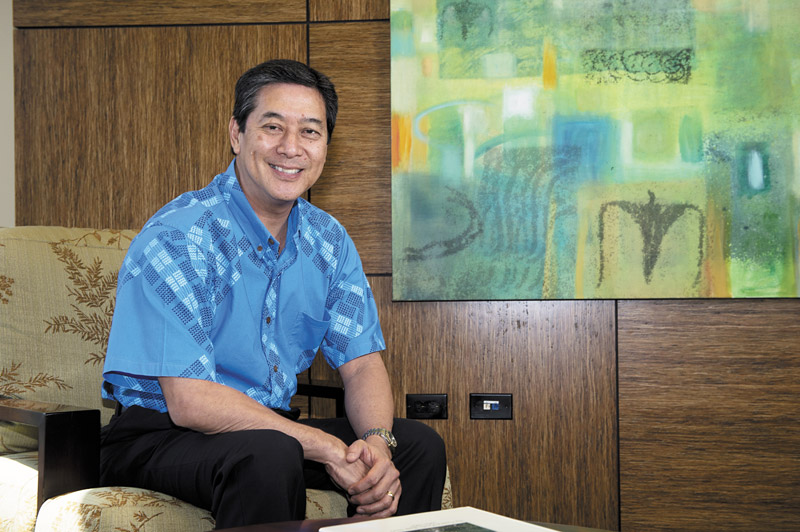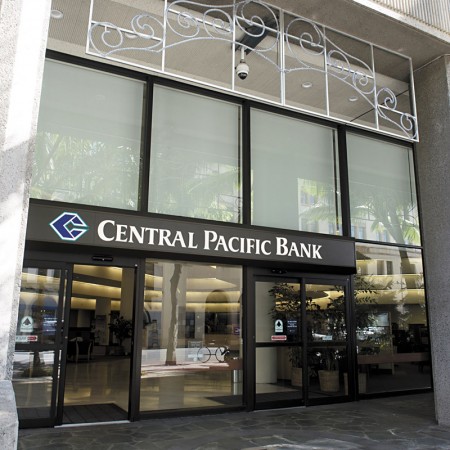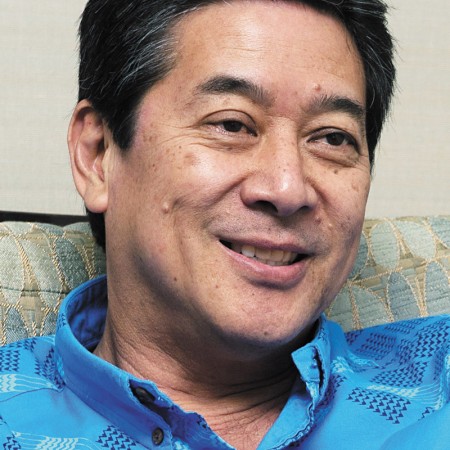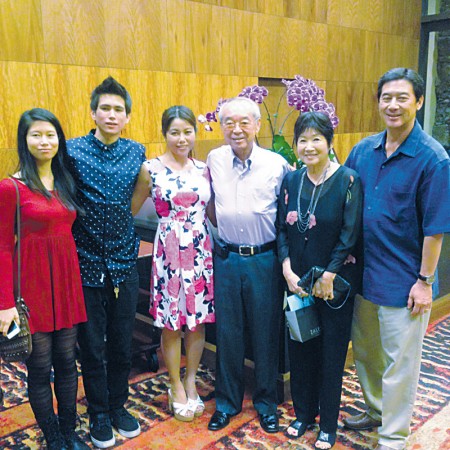Balancing Act
When Central Pacific Bank president Lance Mizumoto mentioned to his school pal David Ige that he’d do whatever he could to help, the governor asked him to become chairman of the Board of Education. To balance these responsibilities, he turns to yoga
“Let me know if you need anything else.”
We have all said it. It’s a throw-away line that just comes out, like “Bless you” when someone sneezes or “You too” when our server tells us to enjoy our meal.
But sometimes this knee-jerk closing line gets taken seriously. This was the case with Lance Mizumoto, president of Central Pacific Bank, when he uttered it after a fund-raiser for his childhood buddy David Ige.
Mizumoto had served as treasurer for Ige early on in his political career, but when Ige decided to make a push for the highest office, Mizumoto declined.
“When he decided to run for governor, I told him that load would be too much for me, but that I would support him in any way I could,” says Mizumoto from his top-floor office in the CPB building in downtown Honolulu. “So I put together a fundraiser for him and told him if there was anything else I could do please let me know … but we all say that, not realizing what we have said or committed to!”
The governor filed away this offer until this past spring, when wife Dawn was jogging up Bishop Street and happened to run in to Mizumoto and asked if the governor and she could meet with him socially.
- CPB’s downtown offices
- Mizumoto relaxes
- The Mizumotos (from left): Yuna, Nico, wife Ayumi, parents Allen and Mimi Mizumoto, and Lance PHOTO FROM MIZUMOTO FAMILY
“They never meet socially,” says Mizumoto with a chuckle. “I knew something was up, and after a few pleasantries, Dawn said, ‘Let me get to the point. We want you on the Board of Education.’
“I sat there for a few seconds and thought about what is it they are asking of me and why. So, because of my relationship with them and being a public-school graduate, there are very few opportunities when you can give back to the public-school system, and this seemed to be the right opportunity.”
From the outside, being chairman of the BOE would be the kind of job from which you’d flee. For starters, it’s a volunteer position — there is no paycheck — and as chair you become one of the lead punching bags in the press for everything that is wrong with the schools.
There is a reason Department of Education superintendent Kathryn Matayoshi makes $50,000 more a year than the governor: The job is tough.
But Mizumoto is a man of his word, and he has a soft spot in his heart for our public schools. He met Ige in middle school and both graduated from Pearl City High School. The impressions his teachers there made on him led him to begin to pursue a career in teaching before switching tracks to Shidler College of Business at UH Manoa.
His position as BOE chairman is year-to-year at the discretion of the governor, and the steep learning curve for a career banker to learn the nuances of running the 10th-largest school district in the country is considerable.
He has had to use his vacation days and holidays for committee and board meetings, and his weekends are filled with reading new policies, but in the end he believes the skills he has learned in the financial world will help him navigate the educational one.
“I try to employ a lot of what I do at the bank: I meet with the employees, go to the branches to communicate and get feedback from them,” says Mizumoto, whose lone teaching experience came from conducting a month-long financial literacy class for third-graders on Maui, where he had to resort to a candy-for-answers scheme to garner a response. “I have met with a group of 10 principals. It’s a roundtable discussion — here at the bank we call it Ohana Time. You get to talk, ask questions and express concerns. I want to do it with principals and the Complex Area superintendents level as well.”
What he has learned since taking on the position this summer is that there is no one right way to teach the nearly 180,000 children in the system. He feels that, while it is important for the BOE to be able to deal with the larger issues that face schools, like utilities, food service and transportation, he would like to give more autonomy to the principals in the way they implement curriculum.
“When we talk about empowerment, it is not just decision-making over fiscal resources. It is empowerment over curriculum and the instruction materials that they need to improve students’ performance,” says Mizumoto. “Every school is different — one size does not fit all. The schools are different because the composition of the students differs from location to location, so I think the principals are in the best position to know what is best for the students in their locale.”
After setting the course for our keikis’ future on his days off, Mizumoto still has his responsibilities as president of CPB, where he took the helm in June of last year. He oversees the strategic direction and management of all lines of CPB’s business, from commercial banking and real estate to residential mortgages and wealth management.
In a quarter century in the financial district, he has worked for the big boys at Bank of Hawaii and First Hawaiian, but finds he enjoys the intimacy of running a smaller bank.
“The culture is very unique. Having been at the two large banks prior to coming here, I could sense the differences between working at a small organization as opposed to a big one,” says Mizumoto, whose bank has 36 branches on the four major islands. “There is a lot to be said for being small, knowing the people you work with, which gives you more influence and helps you shape the culture.”
Being a part of the community is integral to CPB, even when times are tough. This year marked the sixth annual employee-led Walks For You that provided more than $100,000 this year to charities, including Make-A-Wish and Alzheimer’s Association Aloha Chapter. The dollar amount is made up of half employee contributions matched by funds from Central Pacific Bank Foundation, which was not the case at the walk’s inception.
“The first year was when the bank was in financial troubles,” says Mizumoto, who says regulations precluded it from contributing to the event. “The bank could not support a donation, and yet the employees felt compelled to support the community, so initially the money came straight out of the pockets of the employees.”
In addition to its charitable work, CPB also supports the underserved in the small-business sector, and fights our growing affordable-housing shortage by helping fund projects such as 801 South Street and Stanford Carr’s Keauhou Place.
This support is crucial, but sometimes what is even more important in a bank is a friendly, familiar face.
“We are trying to provide a unique customer experience with simple things like addressing the customers by name. When people come to our branches and someone knows your name, you feel like you are treated as an individual,” says Mizumoto. “The employees have come up with ideas, as well, like customer appreciation day, where several of our branches provide sushi or cookies
when they come in to show their level of appreciation.”
The idea of thinking small seems to be working, as CPB posted a 34 percent jump in profits for the second quarter of this year over last.
So, with the pressure cooker of being a bank president and having to sweat out all the issues of the BOE, how does Mizumoto relax?
With Bikram Yoga, of course.
“The first day I did it, I hated it, I thought it was the worst thing,” says Mizumoto with a laugh. “But because I paid $30 for unlimited use over the first two weeks, I’d better at least make use of the $30 and make it a cheaper class!
“Each time it got easier, and I came out feeling refreshed, healthier and with a clearer mind. It is more meditative than physical — just being able to clear my mind and focus on a posture while balancing on one leg, you can’t help but focus on that and not the bank or the BOE.”









